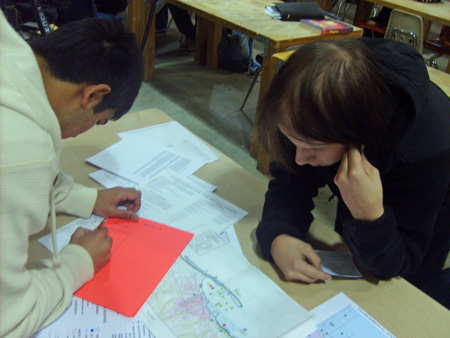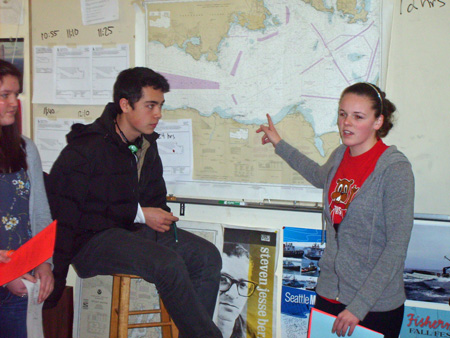Ballard High School students are learning how to handle oil spills. On Thursday, students in the school’s Maritime Academy conducted an “oil spill drill” as part of their Sophomore Maritime Survey. The fictitious spill took place off Port Angeles where one oil tanker collided with another vessel.

Students using ESI (environmental sensitivity index) maps to determine what animals would be affected by the spill
The students were divided into five teams: Command, science, logistics, prediction and safety. During the drill the students had to determine the best method to contain, clean up and restore the area of the spill.
“One key to the success is the communication between the different groups,” John Foster of the Maritime Academy tells us. “The science team relays information about the spilled product and the animals effected, the logistics team figures out where spill response equipment is kept, and how to get it to the site, the prediction team tells the others where the spill is likely heading and the safety team ensures that the clean up is done safely. Taking all this information, the command team must come to a decision about how to best attack the spill.”

Students using a nautical chart of the Strait of Juan De Fuca to explain where the oil spill is headed
“The students had to demonstrate their familiarity with different types of spill response equipment (containment boom, skimmers, etc.), nautical charts, NOAA oil spill response software, tide tables and federal guidelines for spill response.,” Foster tells us. “Within an hour the teams were able to locate the spill, predict its trajectory for the next three days, organize and stage equipment to respond, and set up a decontamination station for effected personnel and animals.”
If you’re not familiar with the Ballard Maritime Academy, it is a three-year program at Ballard High School with a hands-on curriculum that focuses on introducing students to the maritime industry and marine sciences. (Thanks John for the photos and information!)


John Foster does an excellent job with real world activities related to the maritime industry.
This is the kind of education President Obama is talking about.
This is the kind of education President Obama is talking about.
why not teach class the dilemma of soil consumption and dependence, plus the inevitable reality that our lives will spill over when oil is to expensive to think about mistakes in the ocean.
might as well continue to convince they can all get degrees in computer science and do the oil clean up work ipods.
Oil consumption*